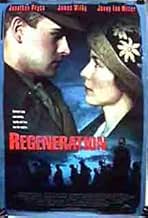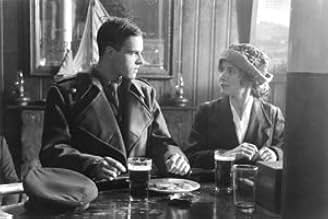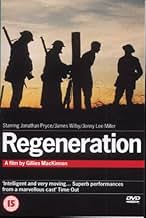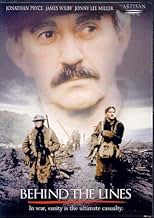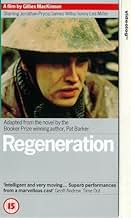IMDb RATING
7.0/10
2.6K
YOUR RATING
Based on Pat Barker's novel of the same name, "Regeneration" tells the story of soldiers of World War One sent to an asylum for emotional troubles. Two of those soldiers are England's most i... Read allBased on Pat Barker's novel of the same name, "Regeneration" tells the story of soldiers of World War One sent to an asylum for emotional troubles. Two of those soldiers are England's most important WW1 poets.Based on Pat Barker's novel of the same name, "Regeneration" tells the story of soldiers of World War One sent to an asylum for emotional troubles. Two of those soldiers are England's most important WW1 poets.
- Nominated for 1 BAFTA Award
- 17 nominations total
- Director
- Writers
- All cast & crew
- Production, box office & more at IMDbPro
Featured reviews
10LukeS
Regeneration treats its audience with respect. The dramatic denouement and characters are not simply laid bare for a popcorn-audience to mindlessly digest. The film unfolds, the scenarios develop, the characters live and breath the ugly reality of warfare. And this all happens in a natural, credible manner beautifully shot and paced by the under-rated Gillies McKinnon.
The opening aerial shot of the bloody consequences of battle are every bit the emotional and visceral equal of Spielberg's lauded 20-minute opening sequence in Saving Private Ryan. The rest of the film - in my opinion - surpasses Ryan as a whole in terms of its drama, poetry, anguish and thought.
The performances are outstanding. Jonathan Pryce's portrayal of Rivers falling apart at the seams as he adopts the neuroses and trauma of his patients is astonishing. Johnny Lee Miller is also excellent as the (initially) mute soldier, haunted by the brutality of a trench-attack. James Wilby's Siegfried Sassoon is perhaps the toughest role to play in the film and yet he surpasses any prior (or subsequent) performances with a characterisation that swings from harsh to likeable, strong to weak, right to wrong.
All of the numerous storylines are well constructed and followed to their natural conclusion. There are no false avenues; no bum notes; no waste.
The source material is beautifully adapted for the film (by the rare breed of writer-producer, Allan Scott), losing none of its pace or characterisation. The emotional weight so prominent in Barker's novel are perfectly transferred into the movie. How wonderful for a modern film to have non-stereotypical, imperfect lead characters and lack easy conclusions. How beautifully evoked is the friendship between Sassoon and Owen. There is no sacharine sentiment in this movie; nor artificial shock to induce pity; nor a wasted scene or moment of dialogue. Equally, the period look of the film is stunning. Filmed in Scotland, the vistas are beautifully bleak and wintry. The atmosphere of the First World War is all too frighteningly real.
The music, whilst beautiful, is perfectly restrained. Harking back to the films of the seventies, long moments of silence pervade Regeneration. How did things go so badly wrong in the last twenty years in this respect?
Regeneration achieves the very rare distinction of matching (if not surpassing) the beautiful and moving novel on which it is based. Thoughtful film-goers should treat themselves to this wonderful and intelligent film.
The opening aerial shot of the bloody consequences of battle are every bit the emotional and visceral equal of Spielberg's lauded 20-minute opening sequence in Saving Private Ryan. The rest of the film - in my opinion - surpasses Ryan as a whole in terms of its drama, poetry, anguish and thought.
The performances are outstanding. Jonathan Pryce's portrayal of Rivers falling apart at the seams as he adopts the neuroses and trauma of his patients is astonishing. Johnny Lee Miller is also excellent as the (initially) mute soldier, haunted by the brutality of a trench-attack. James Wilby's Siegfried Sassoon is perhaps the toughest role to play in the film and yet he surpasses any prior (or subsequent) performances with a characterisation that swings from harsh to likeable, strong to weak, right to wrong.
All of the numerous storylines are well constructed and followed to their natural conclusion. There are no false avenues; no bum notes; no waste.
The source material is beautifully adapted for the film (by the rare breed of writer-producer, Allan Scott), losing none of its pace or characterisation. The emotional weight so prominent in Barker's novel are perfectly transferred into the movie. How wonderful for a modern film to have non-stereotypical, imperfect lead characters and lack easy conclusions. How beautifully evoked is the friendship between Sassoon and Owen. There is no sacharine sentiment in this movie; nor artificial shock to induce pity; nor a wasted scene or moment of dialogue. Equally, the period look of the film is stunning. Filmed in Scotland, the vistas are beautifully bleak and wintry. The atmosphere of the First World War is all too frighteningly real.
The music, whilst beautiful, is perfectly restrained. Harking back to the films of the seventies, long moments of silence pervade Regeneration. How did things go so badly wrong in the last twenty years in this respect?
Regeneration achieves the very rare distinction of matching (if not surpassing) the beautiful and moving novel on which it is based. Thoughtful film-goers should treat themselves to this wonderful and intelligent film.
Regeneration is an amazing film, it discusses the unseen wounds left on soldiers by war. The emotional trauma it causes them and how best we can help them, if we can at all.
James Wilby gives a remarkable performance as an officer who is sickened by the war that he sees around him. He isn't so much mentally ill as disgusted with war and his contribution in it. Jonny Lee Miller is also amazing in his portrayal of an officer driven mute. When he discovers his voice he is angry and argumentative, but slowly we discover that all of his anger is a shell to protect the hurt that has built up inside of him.
One of the biggest underlying themes in this film is how useless war is, even if it is for the right cause. Mainly because it destroys the human psyche and removes hope.
This is a startling film, and touching and emotional. It cuts to the core of who we all are, as human beings.
James Wilby gives a remarkable performance as an officer who is sickened by the war that he sees around him. He isn't so much mentally ill as disgusted with war and his contribution in it. Jonny Lee Miller is also amazing in his portrayal of an officer driven mute. When he discovers his voice he is angry and argumentative, but slowly we discover that all of his anger is a shell to protect the hurt that has built up inside of him.
One of the biggest underlying themes in this film is how useless war is, even if it is for the right cause. Mainly because it destroys the human psyche and removes hope.
This is a startling film, and touching and emotional. It cuts to the core of who we all are, as human beings.
Regeneration is one of those films you know in advance is going to be painful to watch. Some of the images are quite strong, almost electric, and the photography is very good. Good performances combined with seriously good writing make this an important film to see.
The film opens with a stunning tracking shot that reminded me of Tarkovsky; the technique is used again throughout the film to register the horror of war--the mud, the dead, and the shattered, flailing bodies. Most of the film, however, takes place in an insane asylum, far from the battlefield. Yes, the film is quite "talky," but the talk is very good, very intelligent, very thought-provoking. The film focuses on a number of relationships that develop--principally, the respectful but antagonistic "father-son" relationship between the famous war hero and poet Siegfried Sassoon (who has been sent to the insane asylum for penning an anti-war statement) and Dr. Rivers (whose mission is to get Sassoon to recant and back on the front lines). But other relationships are almost equally important--those between Dr. Rivers and an angry soldier named Billy Prior, between Prior and a local "munitionette," and between Sassoon and the man who would emerge, under his tutorship, as perhaps an even greater war poet, Wilfred Owen.
The drama is based on real events, and the performances are quite stunning. Above all, Jonathan Pryce as Dr. Rivers is simply incredible, a man torn between duty and compassion, a doctor on the verge of becoming a patient himself. In a just world, he would have won an Oscar (but hardly anyone, it seems, saw this film on initial release). The handsome James Wilby gives a very fine performance as Sassoon--in fact, I've never seen him in better form. Johnny Lee Miller perfectly embodies the edgy anger, angst, and shame of Billy Prior. And Stuart Bunce brings a remarkably gentle, otherworldly quality to his haunting portrayal of Wilfred Owen. You absolutely believe that this man has a poet's soul; but he finds his voice not by contemplating beauty but by contemplating supreme horror.
There are many scenes from this film I will never forget--particularly, Dr. Rivers' trip to see another doctor cure a patient of being mute by applying electricity directly to his teeth and larynx. This scene is horrifying and, yet, like the rest of the film, restrained, in part because of the way Pryce portrays Rivers' reactions. Another unforgettable scene is the abrupt, shattering ending--but I won't give that away. Suffice it to say that words, especially the words of a great poet, sometimes are more powerful than shocking images.
This is a very intelligent, moving, humane, and important film. What a shame that it has been so overlooked.
The drama is based on real events, and the performances are quite stunning. Above all, Jonathan Pryce as Dr. Rivers is simply incredible, a man torn between duty and compassion, a doctor on the verge of becoming a patient himself. In a just world, he would have won an Oscar (but hardly anyone, it seems, saw this film on initial release). The handsome James Wilby gives a very fine performance as Sassoon--in fact, I've never seen him in better form. Johnny Lee Miller perfectly embodies the edgy anger, angst, and shame of Billy Prior. And Stuart Bunce brings a remarkably gentle, otherworldly quality to his haunting portrayal of Wilfred Owen. You absolutely believe that this man has a poet's soul; but he finds his voice not by contemplating beauty but by contemplating supreme horror.
There are many scenes from this film I will never forget--particularly, Dr. Rivers' trip to see another doctor cure a patient of being mute by applying electricity directly to his teeth and larynx. This scene is horrifying and, yet, like the rest of the film, restrained, in part because of the way Pryce portrays Rivers' reactions. Another unforgettable scene is the abrupt, shattering ending--but I won't give that away. Suffice it to say that words, especially the words of a great poet, sometimes are more powerful than shocking images.
This is a very intelligent, moving, humane, and important film. What a shame that it has been so overlooked.
This was an excellent movie. Amazing photography and casting and an
intelligent scenario which passes messages about how horrific war is
to the audience in the mildest yet touching way I've seen.
The story involves a hospital in Scotland where officers are sent when
they suffer a breakdown, a common phenomenon in the first and second
world wars. In there, a doctor (played by Jonathan Pryce) attempts to
treat his patients in a more humane way than the one other doctors of
the time choose. Through the stories of characters in the hospital --
including Siegfried Sassoon and Wilfred Owen, two poets who happen to
meet and become friends in the hospital -- the life of the British
soldiers in the first World War, as well as several political messages
about that affecting era for humanity are successfully transmitted to
the audience, without blood, without effects or huge battle scenes in
a way that touches and indicates its significance more than any other
film I've seen about the subject.
The performances are excellent, with Johny Lee Miller -- who apart
from this movie has not shown any signs of serious acting that I've
seen -- delivering a very good performance of a shocked and ambitious
officer and Jonathan Pryce metaphorically accepting the ideas of
Sassoon -- who opposes to the war after a point where he realises its
futility and the lack of values in the politicians driving it -- can
be though as the link between the soldiers and humanity itself.
It is definitely a movie I would recommend! Excellent.
intelligent scenario which passes messages about how horrific war is
to the audience in the mildest yet touching way I've seen.
The story involves a hospital in Scotland where officers are sent when
they suffer a breakdown, a common phenomenon in the first and second
world wars. In there, a doctor (played by Jonathan Pryce) attempts to
treat his patients in a more humane way than the one other doctors of
the time choose. Through the stories of characters in the hospital --
including Siegfried Sassoon and Wilfred Owen, two poets who happen to
meet and become friends in the hospital -- the life of the British
soldiers in the first World War, as well as several political messages
about that affecting era for humanity are successfully transmitted to
the audience, without blood, without effects or huge battle scenes in
a way that touches and indicates its significance more than any other
film I've seen about the subject.
The performances are excellent, with Johny Lee Miller -- who apart
from this movie has not shown any signs of serious acting that I've
seen -- delivering a very good performance of a shocked and ambitious
officer and Jonathan Pryce metaphorically accepting the ideas of
Sassoon -- who opposes to the war after a point where he realises its
futility and the lack of values in the politicians driving it -- can
be though as the link between the soldiers and humanity itself.
It is definitely a movie I would recommend! Excellent.
Did you know
- TriviaThe film used a lot of present and former Territorial Army soldiers as extras for larger scenes. This includes soldiers from 52nd Lowland, 6th Battalion Royal Regiment of Scotland, located in Hotspur street, Glasgow.
- GoofsThe camera and the crane on which it is suspended are reflected in several puddles during the very opening shot (of the battlefield).
- Quotes
Capt. William Rivers: I find it interesting that you don't stutter.
Billy Prior: I find it even more interesting that you do.
- Alternate versionsReleased in the USA in a 96 minute version under the title "Behind the Lines".
- ConnectionsFeatured in The 100 Greatest War Films (2005)
- SoundtracksJust Before The Battle, Mother
Words and Music by George Frederick Root (As G.F. Root)
Performed by Craig Titus
- How long is Regeneration?Powered by Alexa
Details
- Release date
- Countries of origin
- Language
- Also known as
- Krigets dårar
- Filming locations
- Overtoun House, Dumbarton, West Dunbartonshire, Scotland, UK(Craiglockhart Hospital)
- Production companies
- See more company credits at IMDbPro
Box office
- Gross US & Canada
- $33,131
- Opening weekend US & Canada
- $19,593
- Aug 16, 1998
- Gross worldwide
- $33,131
Contribute to this page
Suggest an edit or add missing content


